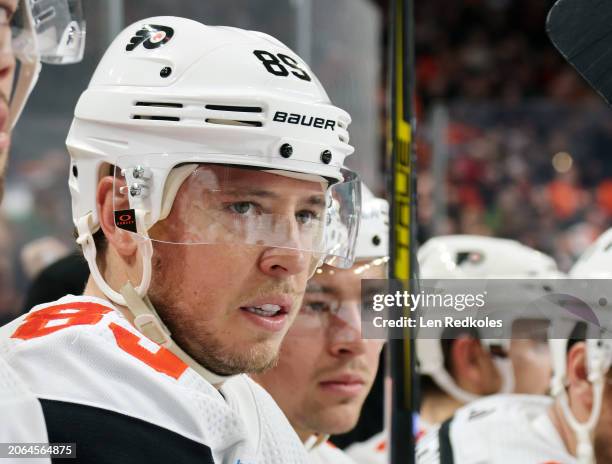Photo Credit Lenny Redkoles
With the Philadelphia Flyers General Manager Danny Briere trying to find some way to create cap space before free agency commences on July 1st, yet another player has blocked a deal from happening.
Recently, the Flyers were searching for a way to prevent them from having to shell out $5,875,000 again to an underperforming 35-year-old winger in Cam Atkinson. Who was only able to accumulate 13 goals and 15 assists for 28 points this past season. Folks, if you do the math, it adds up to him making $214,285.71 per point, and at least in my mind, that doesn’t cut it. But, after the team had worked really hard laying out a deal that would alleviate at least some of the burden with them possibly having to retain some of his contract, Cam, who still holds a modified no-trade clause at this the last year in his contract nixed the deal because he did not wish to play for the San Jose Sharks who the deal was in place with.
But, as far as the team goes, this is not the first time this has happened. In fact, since the official induction of the No Trade Clause (NTC)/No Movement Clauses (NMC) back in 2005, CBA’s that included the initiation of the Salary Cap. In the past the Flyers have had multiple stars block trades from happening. For instance, Giroux blocked a supposed very lucrative return from the Colorado Avalanche from occurring before the team had to eventually settle for what they could get from Florida (which, lucky for them, turned out ok, I guess). But their bad luck extends beyond that. It also includes players from other teams’ example being when defenseman Torey Krug from the St. Louis Blues blocked a trade that would have brought him to Philly using his no trade clause.
Now, long before the 2005 CBA made it official, players were asking for and receiving no-trade clauses/no-movement clauses in their contracts, but they were only handed out to elite players who were faces of the team’s franchise. A guy who a team would draft and hopefully want to keep until they decide to hang up their skates for the last time. But, now it has just gotten out of hand.
Take the Flyers, for example. We already talked about Atkinson having one but that was gifted to him by Columbus’ former GM Jarmo Kekalainen some years ago. When Chuck Fletcher was in power, he handed out like candy for example when he signed Travis Sanheim to an eight year $50 million deal that pays him $6.25 annually until 2031. Chuck gave him a full no-trade clause for the first four years of the deal and a modified no-trade clause for the last four years. This means if the Flyers ever wished to trade him, Sanheim would be allowed to come up with a list of 12 teams he would be able to reject a trade to. Another Fletcher folly was Sean Couturier’s eight-year $62 million deal. Where Chuck gave Coots a full NMC until 2029 when he will be 36 years old, and a modified no-trade clause in his final season of the deal, that’s a long time to retain that right, especially after having had multiple seasons where he has not played entire seasons or half seasons due to injury. At least those players are considered top-line players and not fourth-line brawlers like Nic Deslauriers, who good old Chuck gave out a modified no-movement clause to in the first two years of his four year seven million dollar deal he signed him to back in 2022.
Even though I had more faith in Briere in this respect when he took the job, he ended up giving in and allowed a utility defenseman in Nick Seeler to receive a no-trade clause for the first two years of his new contract.
I get the players and their union wanting to fight for this, given the fact that these players have families and whole lives outside of hockey to think about, but at the end of the day, these clauses were made to be given to the elite, not some a random scrub player who doesn’t even make the roster every night. By allowing this, franchises are putting themselves into compromising situations that could have been avoided. And because of that, they are being forced to make drastic unwanted changes to their roster, like moving out other players that they would otherwise like to keep in order to combat the bad decisions made prior when they agreed to sign a player who was good a few years ago when they signed him but has underachieved ever since.
It may be a competitive market out there. Teams may have to give a little in order to make a deal with a player they want, in order to prevent others from doing just that. Still, if the owners came together on this issue and refused to offer this once luxury bargaining chip to players who don’t deserve it, they could shift the power back in their direction. If they don’t, they will continue to be snake-bitten by their bad contractual decisions for years to come.








